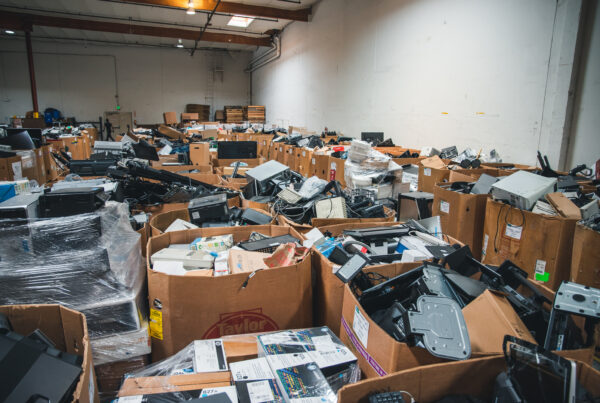Washington D.C., a city known for its power corridors and historic landmarks, now grapples with a distinctly modern challenge: the surge of electronic waste. As technology’s relentless march propels us into an increasingly digital future, the District finds itself at a critical juncture, facing the mounting consequences of our collective e-waste footprint. Yet, the e-waste regulations in Washing D.C. stand strong in helping businesses and individuals reduce the consequences and impact on the environment.
The deluge of outdated devices in D.C., from smartphones to office equipment, threatens to overwhelm landfills and leaches toxic materials into the soil and water. The e-waste regulations in D.C. have become more than just bureaucratic red tape; they’re a lifeline to environmental sustainability and public health. The city’s commitment is evident in its comprehensive framework of laws and initiatives designed to stem the e-waste tide.
Table of Contents
- Understanding D.C.’s E-Waste Laws: A Comprehensive Guide
- How to Comply with E-Waste Regulations in Washington, D.C.
- The Challenges of E-Waste Management Facing D.C. Businesses
- Partner with Human-I-T to Enjoy Secure, Sustainable E-Waste Management in Washington D.C.
- Get Help Managing Your E-Waste in Washington, D.C.
Understanding D.C.’s E-Waste Laws: A Comprehensive Guide
Washington D.C.’s Sustainable Solid Waste Management Amendment Act of 2014
The Sustainable Solid Waste Management Amendment Act of 2014 serves as the cornerstone of D.C.’s e-waste regulations, ushering in a new era of environmental responsibility. This groundbreaking legislation establishes a legally binding framework that reshapes how the District handles electronic waste. By mandating the diversion of e-waste from landfills and incinerators, the Act propels D.C. towards its ambitious goal of 80% waste diversion by 2032. Additionally, the Act imposes fines of up to $1,000 per violation for improper e-waste disposal.
eCYCLE DC: Bridging the Gap Between Consumers and Responsible Recycling
Building upon the foundation laid by the 2014 Act, the eCYCLE DC program is a dynamic solution to the e-waste challenge. This innovative initiative bridges the gap between consumers and responsible recycling practices, offering a network of convenient drop-off locations throughout the city. From bustling downtown areas to residential neighborhoods, eCYCLE DC ensures that no corner of the District is left without access to proper e-waste disposal options.
The program’s success hinges on its collaboration with manufacturers, who are required to establish free and easily accessible recycling options for consumers. It’s an official part of the e-waste regulations in Washington D.C. This partnership between public policy and private sector engagement exemplifies D.C.’s commitment to creating a sustainable e-waste management ecosystem.
Defining Covered Electronic Equipment (CEE): The Scope of D.C.’s E-Waste Regulations
Covered Electronic Equipment (CEE). is defined by a wide array of devices, from computers and televisions to printers and electronic peripherals. By clearly delineating what constitutes CEE, the District ensures that its e-waste regulations cast a wide net, capturing the full spectrum of electronic devices that pose potential environmental hazards.
The CEE definition serves as a guidepost for manufacturers, retailers, and consumers alike, eliminating ambiguity and streamlining compliance efforts. It empowers stakeholders to make informed decisions about device disposal, ensuring that even the smallest electronic components are channeled into proper recycling streams.
D.C.’s e-waste laws are reshaping the responsibilities of businesses operating within the District. From multinational corporations to local retailers, every entity that manufactures, sells, or handles electronic devices must now navigate a new landscape of obligations and expectations.
How to Comply with E-Waste Regulations in Washington, D.C.
As D.C.’s e-waste regulations take root, they’re reshaping the responsibilities of businesses operating within the District. From multinational corporations to local retailers, every entity that manufactures, sells, or handles electronic devices must now navigate a new landscape of obligations and expectations.
Manufacturer Responsibilities for E-Waste in Washington, D.C.
Registration with DOEE: The First Step Towards Compliance
Manufacturers of covered electronic equipment (CEE) must now register with the Department of Energy and Environment (DOEE), signaling their commitment to responsible e-waste management. This registration process is a public declaration of accountability, ensuring that every device entering the D.C. market is backed by a responsible party ready to manage its end-of-life journey.
The registration fee structure is tiered based on sales volume, with manufacturers selling fewer than 100 units exempt from fees, those selling 100-249 units paying $1,500, and those selling 250 or more units paying $3,000. This graduated system ensures that smaller manufacturers aren’t disproportionately burdened while still holding larger companies accountable.
Crafting Comprehensive Collection and Recycling Plans
With registration complete, manufacturers face their next challenge: developing robust collection and recycling plans. These plans must detail how they’ll collect and process e-waste, ensuring accessibility for all District residents. From strategically placed drop-off points to innovative mail-back programs, manufacturers are now at the forefront of creating a seamless e-waste recycling ecosystem.
According to DOEE guidelines, these plans must include:
- A minimum of one permanent publicly accessible collection site in the District
- Details on how the manufacturer will transport and recycle collected CEE
- Strategies for public education and outreach about the recycling program
Manufacturers must also submit annual reports detailing the weight of CEE collected and recycled, providing tangible metrics of their programs’ success.
Labeling Requirements: Transparency in Every Device
Transparency takes center stage with D.C.’s labeling requirements. Manufacturers must now clearly mark their products, providing consumers with essential information about proper disposal methods. This labeling is a crucial link in the e-waste education chain, empowering consumers to make informed decisions at the point of purchase and disposal.
The DOEE mandates that labels must:
- Be permanently affixed and readily visible
- Clearly identify the manufacturer’s brand name
- Include information on how to recycle the device through the manufacturer’s program
A study by the Consumer Technology Association found that clear labeling can increase proper e-waste disposal by up to 30%, underscoring the importance of this requirement.
Retailer Obligations for Managing E-Waste in Washington, D.C.
Retailers in D.C. now serve as crucial intermediaries in the e-waste management process. They must verify that the products they stock come from registered manufacturers. Additionally, retailers are tasked with educating consumers about available recycling options, transforming every purchase into an opportunity for environmental awareness.
Specific retailer obligations include:
- Maintaining documentation of manufacturer registration for all CEE sold
- Providing written information to consumers about e-waste recycling options at the point of sale
- Ensuring that only CEE from registered manufacturers is sold in their stores
A survey by the National Retail Federation found that 87% of consumers are more likely to shop at stores that support recycling initiatives, highlighting the potential business benefits of these obligations.
As businesses grapple with the new e-waste regulations in Washington D.C., they face both challenges and opportunities. The initial hurdles of compliance give way to the potential for innovation, brand enhancement, and leadership in corporate responsibility. Yet, for many organizations, the path forward remains unclear, fraught with potential pitfalls and unforeseen complications. The complexities of e-waste management in D.C. demand not just compliance, but a fundamental shift in how businesses approach the lifecycle of electronic products.
The Challenges of E-Waste Management Facing D.C. Businesses
As D.C. forges ahead with its ambitious e-waste regulations, businesses find themselves grappling with a trio of formidable challenges.
For one, the rapid evolution of electronic devices poses a unique challenge to e-waste management efforts. The lifespan of gadgets shrinks with each passing year, accelerating the flow of obsolete hardware into the waste stream.
Consider this: The average smartphone’s lifecycle has plummeted from 4.7 years in 2016 to just 2.9 years in 2023. This accelerated turnover rate floods the District with a constant deluge of outdated devices, each requiring proper disposal and recycling.
Additionally, the specter of information theft looms large over e-waste disposal processes. Each discarded device potentially harbors a treasure trove of sensitive data, from corporate secrets to personal identities.
A sobering statistic underscores this risk: According to a 2022 study by the Ponemon Institute, 40% of data breaches involve improperly disposed electronic devices. For D.C. businesses, particularly those in government-adjacent sectors, the stakes couldn’t be higher.
The challenge extends beyond simply wiping devices clean. Companies must now implement rigorous data sanitization protocols, often requiring specialized equipment and expertise. This need for enhanced security measures adds layers of complexity to the already intricate process of e-waste management.
And as noble as the District’s e-waste initiatives may be, they come with a price tag that many businesses find daunting. A recent survey by the D.C. Chamber of Commerce revealed that small to medium-sized businesses in the District allocate an average of 2.3% of their annual budget to e-waste management compliance. For some, this represents a significant financial strain, particularly in sectors with slim profit margins.
Yet, forward-thinking companies are beginning to view these costs not as just expenses, but as investments in sustainability and brand reputation. This mindset creates a light around e-waste regulations in Washington D.C. A 2023 study by the Consumer Technology Association found that 78% of consumers are more likely to purchase from companies with strong environmental policies, including proper e-waste disposal practices.
As D.C. businesses navigate these choppy waters of technological flux, data security, and financial considerations, a new paradigm emerges. The most successful organizations will be those that view e-waste management not as a regulatory burden, but as an opportunity for innovation and leadership in corporate responsibility. These challenges, formidable as they may seem, are but stepping stones to a more sustainable, secure, and economically vibrant future for the District.
Partner with Human-I-T to Enjoy Secure, Sustainable E-Waste Management in Washington D.C.
As Washington D.C. grapples with the growing challenge of electronic waste, Human-I-T stands ready to offer innovative solutions that go beyond compliance. Our mission is twofold: to create equitable access to opportunity by providing technology to those in need, and to empower businesses to make a positive impact through responsible e-waste management.
We’ve developed a suite of services tailored to the unique needs of D.C. businesses. Our approach covers the entire lifecycle of electronic devices, from pickup to data sanitization and refurbishment.
Here’s how we make a difference:
- Effortless Regulatory Compliance: We ensure your e-waste management aligns with D.C.’s stringent regulations, including the Sustainable Solid Waste Management Amendment Act and the eCYCLE DC program.
- Uncompromising Data Security: Our NAID AAA-certified processes and Department of Defense-approved methods guarantee that your sensitive information is irretrievably erased.
- Tangible Social and Environmental Impact: In 2023, we diverted over 3.5 million pounds of e-waste from landfills and provided refurbished devices to more than 50,000 low-income individuals in the D.C. area.
We urge you to take action today. Review your current e-waste practices and consider how they align with both regulatory requirements and your organization’s values. Are you just disposing of old devices, or are you contributing to a circular economy that extends the life of electronics and puts technology into the hands of those who need it most?
Join us in reimagining e-waste management in the nation’s capital. Together, we can create a future where every discarded device becomes an opportunity to empower communities in D.C. and beyond with digital access, protect our planet, and build a more connected country. Let’s turn the challenge of e-waste in DC into a catalyst for positive change—one device at a time.






